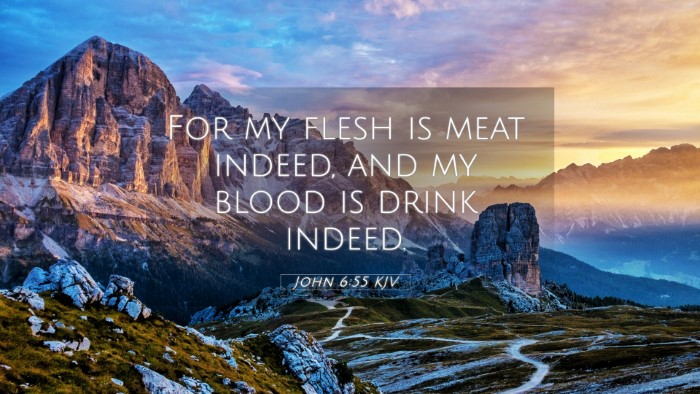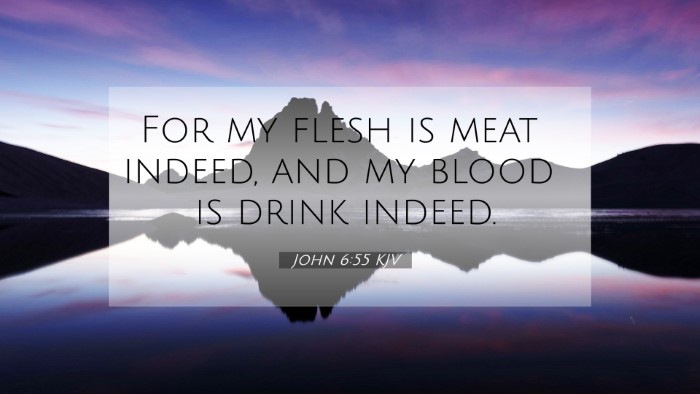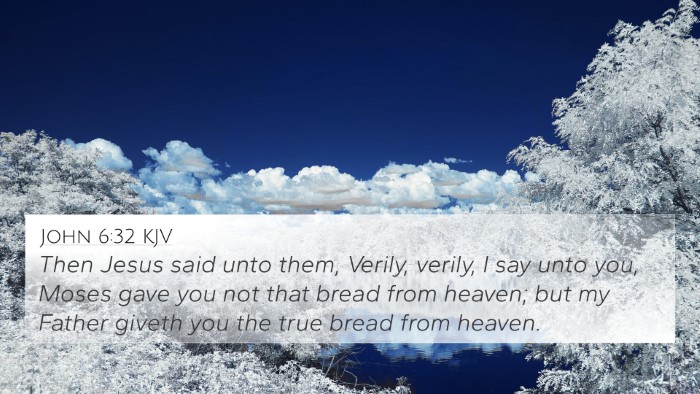Understanding John 6:55
John 6:55 states: "For my flesh is true food, and my blood is true drink."
This verse encapsulates profound theological implications related to the Lord's Supper and the eternal sustenance that Jesus offers. It invites a deeper exploration of the themes of life, sustenance, and the nature of communion with Christ. Insights are drawn from various public domain commentaries to provide a comprehensive understanding of this verse.
Verse Context and Analysis
In the preceding verses, Jesus speaks of the "bread of life" that has come down from heaven, a reference to Himself (John 6:35). The chapter centers on Jesus' miraculous feeding of the 5,000 and serves as an introduction to the symbology of His body and blood as sources of spiritual life. For a thorough analysis, consider the following points aggregated from respected biblical scholars:
-
Matthew Henry: Henry emphasizes that Jesus' proclamation of His body as true food signifies the necessity of partaking in Him spiritually. It points to faith in His death and the reception of His sacrifice as vital for eternal life.
-
Albert Barnes: Barnes interprets this statement as an invitation to consume the benefits of Christ’s atoning work. He draws parallels to the old covenant sacrificial system, stating that Christ’s sacrifice fulfills and surpasses the old traditions.
-
Adam Clarke: Clarke suggests that the phrase "true drink" refers to the transformative power of Jesus' blood, which not only seals the covenant but also sanctifies believers, empowering them to live righteously.
Thematic Connections
John 6:55 is rich in thematic connections that resonate throughout scripture. It is pivotal to consider the inter-Biblical dialogue that reinforces its significance. Here are several Bible verses that connect with John 6:55:
- Matthew 26:26-28: Describes the institution of the Lord's Supper, where Jesus identifies the bread and cup with His body and blood.
- John 6:51: "I am the living bread that came down from heaven." This earlier statement reinforces the idea of Jesus as the sustainer of life.
- 1 Corinthians 11:23-26: Paul recounts the Last Supper, mirroring the themes from John 6 regarding the body and blood of Christ.
- Exodus 12:8-11: The Passover meal connects the blood of the lamb with salvation, which foreshadows the sacrifice of Jesus.
- Hebrews 9:14: Discusses the eternal redemption through Christ’s blood, acknowledging its purifying power.
- Romans 8:31-32: Reassures believers of the benefits of Christ’s sacrifice, emphasizing that if God spared not His Son, how much more will He provide for us.
- Revelation 12:11: Speaks about the overcoming power through the blood of the Lamb, which echoes the theme of victory through Christ's sacrificial love.
Cross-Referencing Biblical Texts
Engaging in cross-referencing biblical texts enhances our understanding of the richness of Scripture. When interpreting John 6:55, we recognize it as a cornerstone verse that not only stands alone but also builds upon connections within the canon of Scripture. Tools for Bible cross-referencing can be extraordinarily helpful, such as:
- Using a Bible concordance to identify key themes and words.
- Employing a Bible cross-reference guide to trace themes across the Old and New Testament.
- Understanding how to use Bible cross-references in personal Bible study can enrich the reader's experience and enlightenment.
Reflective Implications
The declarations in John 6:55 raise essential reflective questions for believers. They compel individuals to contemplate their relationship with Christ as the source of spiritual nourishment. The debate over the literal versus spiritual interpretation of the body and blood indicates the depths of theological inquiry.
This verse serves as an invitation to partake in the life offered through Christ, urging believers to engage in the sacrament meaningfully. Every engagement with this text can lead to deeper reflections on faith and discipleship.
Practical Applications
Bringing the meaning of John 6:55 into practical application offers rich value to a believer's life. Engaging with this verse encourages:
- Regular reflection: Taking time to reflect on the significance of communion can lead to a more profound appreciation of Christ's sacrifice.
- Spiritual nourishment: Seeking Jesus daily as the true sustenance helps in spiritual growth.
- Community sharing: Understanding the communal aspect of the Lord's Supper emphasizes unity in faith among believers.
Conclusion
John 6:55 serves as a foundational text that highlights the sacrificial nature of Christ and His role as the sustainer of spiritual life. This verse invites believers into a transformative relationship through the metaphor of consuming His body and blood, which can be viewed in tandem with numerous other biblical texts. As one continues to explore the connections between Bible verses, this verse stands out prominently, serving as a testament to the vital nature of spiritual nourishment through Christ.











